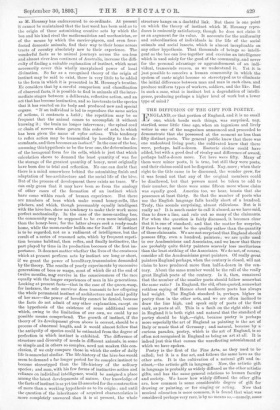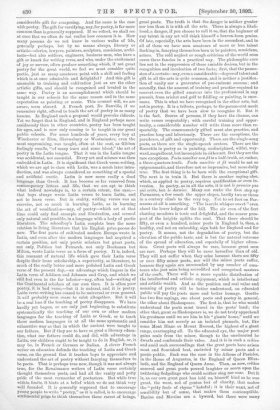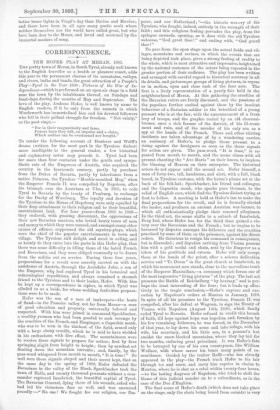THE DIFFUSION OF THE GIFT FOR POETRY. E NGLA.ND, or that
portion of England, and it is no small one, which heeds such things, was surprised, nay, startled, some little time ago, when an ingenious and lively writer in one of the magazines announced and proceeded to demonstrate that she possessed at the moment no less than fifty distinct poets. The general public knew that there was one undoubted living poet; the cultivated knew that there were, perhaps, half-a-dozen. Esoteric circles could have added, but with a good deal of rivalry and difference of award, perhaps half-a-dozen more. Yet here were fifty. Many of them were minor poets, it is true, but still they were poets, and their claims could not be disputed. Nay, more ; when their right to the title came to be discussed, the wonder grew, for it was found not that any of the original members could be disallowed, but that powers must be taken to add to their number, for there were some fifteen more whose claim was equally good. America too, we hear, boasts that she possesses at least thirty. So that the number of poets who use the English language falls hardly short of a hundred. Truly, this sounds surprising, almost ridiculous. But is it really so ? It is much easier to call it absurd, as we have said, than to draw a line, and rule out so many of the claimants. For when the question is fairly discussed, it becomes clear that it is one of standard; and that the matter for surprise, if there be any, must be the quality rather than the quantity of these claimants. We are not surprised that England should possess fifty, even a hundred, painters ; we are quite used to our Academicians and Associates, and we know that there are probably quite thirty painters scarcely less meritorious than the least striking of the Associates. We do not, of course, consider all the Academicians great painters. Of really great painters England perhaps, when the century is closed, will not ' claim to have produced more than half-a-dozen in the cen- tury. About the same number would be the roll of the really great English poets of the century. Is it, then, unnatural that the number of the smaller poets should follow somewhat the same ratio ? In England, the old, often-quoted, somewhat ruthless saying of Horace about mediocre poets has always had weight. The English standard is, perhaps, higher in poetry than in the other arts, and we are often inclined to draw the line high, and speak only of poets of the first rank, as poets at all. This is a fault on the right side; and in England it is both right and natural that the standard of poetry should be high,—right, because poetry is perhaps more especially the art of England as painting is the art of Italy or music that of Germany ; and natural, because by a curious paradox, poetry, which is the art of England, is so often not recognised in England as being an art at all. It is indeed just this that causes the unreflecting astonishment of which we have spoken. Poetry is the first of the Fine Arts, as they used to be called ; but it is a fine art, and follows the same laws as the other arts. It is the cultivation of a natural gift and in- stinct,—the artistic gift in language. Now, the artistic gift in language is probably as widely diffused as the other artistic gifts, and has the same general relations to human faculty and society. We know how widely diffused the other gifts are, how common is some considerable degree of gift for drawing or painting, or for singing or acting. Now that musical education is more common, it is found that what was considered perhaps very rare, is by no means so,—namely, some considerable gift for composing. And the same is the case with poetry. The gift for versifying, nay, for poetry, is far more common than is generally supposed. If we reflect, we shall see at once that we often do not realise how common it is. How many persons do we not know in various walks of life, generally perhaps, but by no means always, literary or artistic—clerics, lawyers, painters, sculptors, musicians, arebi- teats—but also soldiers, engineers, business men, who have a gift or knack for writing verse, and who, under the excitement of joy or sorrow, often produce something which, if not great poetry for the great world, we feel we must consider quite poetic, just as many amateurs paint with a skill and feeling which is at once admirable and delightful ? And this gift is amenable to training and cultivation just as are the other artistic gifts, and should be recognised and treated in the same way. Poetry is an accomplishment which should be taught in our schools for the same reason and in the same expectation as painting or music. This counsel will, we are aware, seem absurd. A French poet, De Banville, if we remember right, offered to teach the art of poetry in so many lessons. In England such a proposal would provoke ridicule. Yet we forget that in England, and in England perhaps more assiduously than in other countries, poetry has been taught for ages, and is now only ceasing to be taught in our great public schools. For some hundreds of years, every boy at Winchester or Eton, Shrewsbury or Westminster, even the most unpromising, was taught, often at the cost, as Gibbon feelingly recalls, "of many tears and some blood," the art of poetry in the Latin tongue. That it was in the Latin tongue was accidental, not essential. Every art and science was then embedded in Latin. It is significant that Greek verse-writing, which we are apt to class with Latin, was a much later intro- duction, and was always considered as something of a special and artificial exotic. Latin is now more really a dead language than Greek. It has become so far removed from contemporary letters and life, that we are apt to think what indeed nowadays is, to a certain extent, the case,— that boys always wrote Latin verses to learn Latin, and not to learn verse. But in reality, writing verses was an exercise, not so much in learning Latin, as in learning the art of versification—nay, of poetry—which art at that time could only find example and illustration, and seemed only natural and possible, in a language with a body of poetic literature. The schoolboy's Latin couplets bore the same relation to living literature that his English prize-poems do now. The first poets of cultivated modern Europe wrote in Latin, and even after the modern languages had acquired a certain position, not only poetic scholars but great poets, not only. Politian but Petrarch, not only Buchanan but Milton, wrote Latin verse as a form of poetry. It is indeed, this remnant of natural life which gave their Latin verse despite their loose scholarship, a superiority, as literature, to much of the really better and more polished Latin and Greek verse of the present day,—an advantage which lingers in the Latin verso of Addison and Johnson and Gray, and which we still feel even in the far inferior—nay, often bad—writing of the Continental scholars of our own time. It is often poor poetry, it is bad verse,—but it is natural, and it is poetry. Latin verse-writing has ceased to be universal or even general. It will probably soon cease to exist altogether. But it will be a real loss if the teaching of poetry disappears. We have hardly yet begun, or are only just beginning, to substitute systematically the teaching of our own or other modern languages for the teaching of Latin or Greek, or to teach these modern languages in at all the same systematic and exhaustive way as that in which the ancient were tonight to our fathers. But if they are to have as good a literary educa- tion, what our fathers could do, and did, with advantage in Latin, our children ought to be taught to do in English, or, it may be, in French or German or Italian. A clever French writer on education defends the teaching of Latin and Greek verse, on the ground that it teaches boys to appreciate and understand the art of poetry without fancying themselves to be poets. That is perhaps true now, though it was not always true, for the Renaissance writers of Latin verse certainly thought themselves poets, and had all the vanity and petty pride of the most vernacular of poetasters. But while true within limits, it hints at a belief which we do not think very well founded. It is generally supposed that to encourage young people to write "poetry," as it is called, is to encourage sentimental prigs to think themselves those rarest of beings, great poets. The truth is that the danger is neither greater nor less than it is with all the arts. There is always a likeli- hood, a danger, if you choose to call it so, that the beginner of any talent in any art will think himself a heaven-born genius. Of late, especially, the arts have been in the ascendant, and in all of them we have seen amateurs of more or less talent flocking in, fancying themselves born to be painters, musicians, actors. The cold neglect or rough criticism of the world soon cures these fancies in a practical way. The philosophic cure lies not in the suppression of these amiable desires, but in the recognition and inculcation of two facts ; first, that the posses- sion of a certain—nay, even a considerable—degree of talent and gift in all the arts is quite common, and is neither a justifica- tion of vanity nor a guarantee of pre-eminent success ; and secondly, that the amount of training and practice required to convert even the gifted amateur into the professional in any pursuit, from cricket and golf to fiddling or painting, is enor- mous. This is what we have recognised in the other arts, but not in poetry. It is a tribute, perhaps, to the paramount merit of poetry that we have been slow to recognise it. But it is the fact. Scores of persons, if they have the chance, can write verses respectably ; with careful training and oppor- tunity, a considerable number will write them more than re- spectably. The consummately gifted must also practise, and practise long and laboriously. There are the exceptions, the paradoxes, of gift and opportunity. There are the single-song poets, as there are the single-speech orators. There are the Rossettis in poetry as in painting, undisciplined, wilful, way- ward, magnificent, but incomplete in eitherart. But they are the rare exceptions. Poeta naseitur non fit is a half-truth, or, rather, a three-quarters-truth. Poeta naseitur et fit would be not so- epigrammatic, and therefore not so impressive, but more dully true. The first thing is to be born with the exceptional gift. The next is to train it. But there is another saying also, which, as applied to poetry, requires qualification or even in- version. In poetry, as in all the arts, it is not le premier pao qui &Ate, but is dernier. Many can make the first step up Parnassus, a few reach the upper elopes, hardly two or three in a century climb to the very top. Yet to set foot on Par- nassus at all is something. "The laurels whisper sweet " even about the lower ledges of the hill. The air even of the first slanting meadows is tonic and delightful, and the nearer pros- pect of the heights uplifts the soul. That there should be fifty, or even a hundred, minor poets in England is, then, a healthy, and not an unhealthy, sign both for England and for poetry. It means, not the degradation of poetry, but the elevation of the public taste, and is but the naturel outcome of the spread of education, and especially of higher educa- tion. Great poets will always be rare, because great men are rare. Perhaps they will be rarer hereafter than of old. They will not suffer when they arise because there are fifty or over fifty minor poets, nor will the minor poets suffer, because they again are surrounded by any number of ama- teurs who just miss being accredited and recognised mastera of the craft. There will be a more equable distribution of the intellectual and artistic enjoyment, which is intellectual and artistic wealth. And as the position and real value and meaning of poetry will be better understood, an educated public will pay the poets more and better homage. Goethe has two fine sayings, one about poets and poetry in general, the other about Shakespeare. The first is, that he who would understand the poets must travel in the poets' land ; the other that, great as Shakespeare is, we do not truly apprehend his greatness until we see him in his "giants' home," until we consider him not merely as an isolated pinnacle, but, like some Mont Blanc or Mount Everest, the highest of a giant range, overtopping all. To the educated eye, the major poet gains scale from the minor, though to the uneducated he dwarfs and confounds their value. And it is in such a milieu, and amid such surroundings that the great poets have arisen most and flourished best, encircled by minor poets and a poetic public. Such was the case in the Athens of Pericles, in the Rome of Augustus, in the England of Queen Eliza- beth, and the England of Queen Anne. Then, as now, critics, sneered and great poets poured laughter or scorn upon the twittering fledgelings who could neither sing nor soar. But it is, as our own great poet has told us, himself kind as he was. great, the want, not of genius but of charity, that makes. the "petty fools of rhyme" hateful ; it is their want, not of sensibility but of sense, that makes them contemptible. Bavius and Mtevius are a byword, but there were many better lesser lights in Virgil's day than Bavins and Mtevius ; and there have been in all ages many poetic souls whom neither themselves nor the world have called great, but who have been dear to the Muses, and loved and mourned by the immortal masters of song.




































 Previous page
Previous page